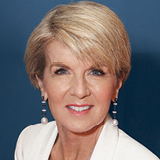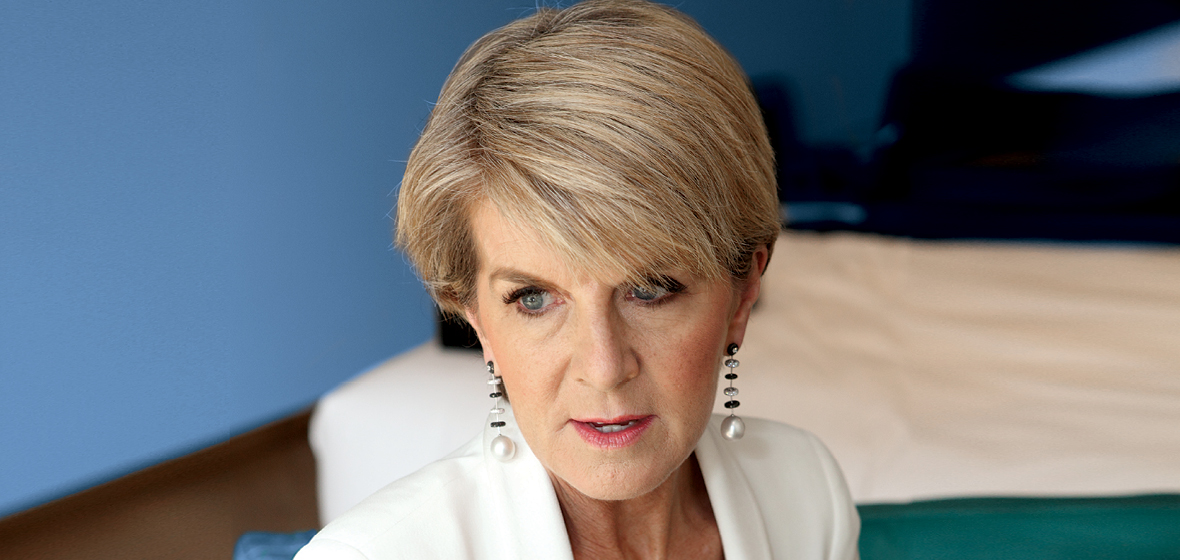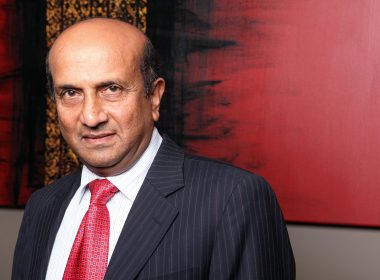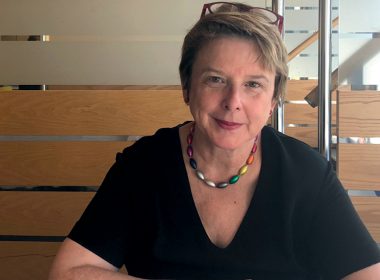I am very conscious of the skills required for a future workforce. Jobs will be global and I want to see young Australians have the opportunity to work, not only in Australia, but in our region. Australia’s engagement in our region is absolutely fundamental to our peace and prosperity.
The year ahead will be huge for Foreign Minister Julie Bishop, with a controversial new US President and administration in office, ongoing conflict in Iraq and Syria, and a final report due on the downing of Malaysian Airlines MH17. She tells JULIE MCCROSSIN about the values she believes are under threat, her work to promote our national interests, job opportunities for lawyers, the source of her personal confidence, and the importance of so-called "fashion diplomacy".
Julie Bishop has had a few firsts in her lifetime. She became Partner in an Adelaide law firm in 1982 when she was just 26 and was the first female managing partner of a major firm in Perth. In September 2013, she became Australia’s first female Foreign Minister after four years as Shadow Minister for Foreign Affairs and Trade.
Since that time, she has cultivated her image as a warm and diplomatic – yet necessarily tough – people’s politician.
Recently, as the whole world held its breath to see who would be the next President of the United States, Bishop, during an interview with the LSJ in a Melbourne hotel room, calmy affirmed her commitment to building rapport with Donald Trump.
“It’s in Australia’s interests to maintain the closest possible relationship with the US,” she said.
“I will work closely with whomever the American public chooses to be their President and I will expect the same of the United States.
“The United States is our largest foreign investor, our security guarantor, our ally. So, of course, Canberra and Washington must have as close as possible a connection.”
Bishop is acutely aware that the world is facing a series of significant challenges. In 2017, she intends to publish a white paper, after extensive consultation, to put in place a framework to help guide Australia in volatile times. It is the first time in 13 years that such an exercise of national and international consultation has been undertaken.
“We’re seeking to put in place a framework of what is in Australia’s national interest,” she explains.
“We will be looking at the values and the interests that matter to Australia, and how our international engagement can advance them. We will develop a white paper that I hope can stand us in good stead for decades. It is not about predicting the future. You can’t do that. But it can paint scenarios and how Australia could or should respond.”
Bishop believes we are at a point in world affairs of significant change, and that we are being challenged and threatened in new ways.
“Non-state actors, such as terrorist organisations, are seeking to redefine the nation state by, for example, declaring an Islamic caliphate over land within the boundaries of a sovereign nation,” she says.
“We see transnational crime that breaks down borders, or ignores borders. Values that made the West are being challenged: the free movement of peoples, democratic institutions, respect for the rule of law, support for the international rules-based order. All these values are being challenged in various ways.
“The power of open markets and free trade are being challenged by protectionist sentiments in some countries, even in the United States. There have been protectionist sentiments in the presidential debate. Its economy has been built on open, liberalised trade.”
Bishop believes some of the challenges to core values pose a serious threat.
“The threat from non-state actors, terrorist organisations, are real and present,” she says. “Australia is engaged in supporting countries to defeat militarily these non-state actors in the Middle East as part of a coalition to defeat terrorists operating in Syria and Iraq.
“The threat of the free movement of people being hampered is, of course, a challenge that Europe is struggling with as people are not only refugees within the definition of the Refugee Convention, but there are also people who are so-called ‘economic refugees’ seeking a better life elsewhere.
The Refugee Convention defines “refugee” as a person outside their own country who fears persecution because of their race, nationality, political opinion or membership of a particular social group. This means that asylum seekers who leave their country for other reasons such as fleeing war, violence, natural disasters or poverty are not classified as refugees.

With about 65 million displaced people in the world, it puts a lot of pressure and challenges on nation states, says Bishop.
“What we are seeing today was not envisaged by the post-war refugee conventions,” she says.
“The conventions specifically focus on those who are persecuted, or fear persecution, and who go to the next safe haven. Now people don’t stay at the next safe haven. They will go on until they find a nation that they wish to live in.”
While there is no formal review of the Refugee Convention under way, Bishop believes the pressure is building in Europe for a reconsideration.
“There is very strong movement afoot in Europe to reconsider the Refugee Convention because what European nations are facing is unprecedented,” she says.
“Of course, there are still many cases of genuine refugees and they are afforded protection. But there are many others who are not, in the UN sense, able to claim protection under law and they have to return home.”
According to Bishop, other priority issues in 2017 include “the peace, stability and security of the region, particularly the South China Sea” which, she says, will be an issue for some time. Iraq and Syria also make the list.
“Our commitment to defend the people of Iraq, through supporting the Iraqi government to build the capacity of their security forces, and our involvement in Syria, are issues of significance,” she says.
“I represent Australia at the International Syria Support Group meetings and we are struggling to find a solution to the military, political and humanitarian crisis in Syria.”
Another matter Bishop believes will take some time is the aftermath of the downing of Malaysian Airlines MH17 over Ukraine in 2014.
“There will be a final report available next year that I believe will identify those believed to be responsible for that,” she says. “Then we, along with the four other countries that make up the joint investigation team, will seek to prosecute those responsible.”
Away from the penetrating gaze of the TV cameras, Bishop is a warm, relaxed and engaging conversationalist. She is also a lawyer, having had a long career as a commercial litigator before entering politics.
Bishop, 60, went to school at St Peter’s Collegiate Girls’ School in Adelaide and graduated in law from the University of Adelaide in 1978. She completed articles in Adelaide and became a partner in a boutique litigation law firm in 1982 when she was 26.
She moved to Perth and completed articles again, as was required in those years if you moved jurisdictions. By 1985, she was a partner at Robinson Cox and practising in commercial litigation.
 Julie Bishop, Foreign Minister
Julie Bishop, Foreign Minister
The firm became Clayton Utz in 1992 and, in 1994, Bishop was elected Managing Partner, making her the first female managing partner of a major law firm in Perth.
“I stood for my first election and I won it. It did make a bit of media at the time, because it was considered unusual,” she says.
“I had 26 male partners and I was the only female. I had another female partner, but she was on leave at the time.”
Bishop’s legal career is an important part of her identity. She holds practising certificates in South Australia, Western Australia and NSW, and is admitted to practise in the High Court. But it was a trip to Harvard Business School in 1996 that shifted the direction of her working life forever.
“It was life changing. At the time, it was a three-month course. I’d been working for many years and this was an opportunity to go overseas and study at a wonderful institution. I made some life-long friends, but it was also where I decided to leave the legal profession and go into politics.”
The reason for Bishop’s change in direction was the influence of a man from a remarkable family.
“I was in a class where the professor was George Cabot Lodge of the Massachusetts Cabot Lodge fame,” she says. “His father had been the senator that ran against John F Kennedy in the early 1960s.
“He spoke to our class about the need for more people to go into public life. He said, ‘Why aren’t you considering giving back to your country through standing for elected office?’
“Over time, this appealed to me. So, while I was at Harvard, I decided I would go into federal politics, if I was able to win a seat. I had done a lot of work in the federal scene as a lawyer. I came back to Australia in 1997 and, by October 1998, I was the Member for Curtin.”
When it comes to “hard power diplomacy”, which involves matters such as the military and trade, Bishop says the skills developed during her legal career are very useful. She also believes her capacity for personal warmth is a crucial skill in her role as Foreign Minister.
“The role of Foreign Minister is to represent Australia overseas, to develop and implement foreign policy, and to make personal connections and develop networks so I can promote Australia’s national interests when travelling overseas and when international visitors come to Australia,” she explains.
“From my perspective, it is absolutely essential to be optimistic and extroverted in making contact with people and establishing rapport and then being able to promote and advocate on behalf of Australia through these connections.”
Surprisingly, one of Bishop’s many strategies for relationship building and “soft power diplomacy” is based upon her life-long interest in fashion.
“I have always been interested in fashion,” she says.
“The whole fashion industry is a significant boost to our economy. Under our policy of ‘economic diplomacy’, we have a sub-category called ‘fashion diplomacy’. Australian fashion designers and manufacturers are able to gain assistance from our embassies if they want to showcase their wares overseas.
“We’ve been very successful in forging relationships through this soft power diplomacy. In late October, we were in Jakarta. I had meetings with the President, the senior ministers and the Foreign Minister. I was invited to speak at Jakarta Fashion Week because Australian fashion designers were showcased. The response fromthe Indonesian media was overwhelmingly positive.
“This is good for relationship building and people-to-people links. These cultural links are just as important as government and business links.”
Bishop is a confident woman, and, when it comes to identifying the source of this vital inner quality, her answer is swift.
“My strongest mentor and role model was my mother, Isabel,” she says.
“She was very keen to study law. That was not something she demanded of me, but she was very encouraging when I decided to pursue law.”
Isabel’s best friend at high school was Iris Stephens who went on to become a District Court Judge in South Australia – something Isabel never had the chance to do.
“My mother was very taken with studying law, but her mother became ill and she went home and onto the family property when she left school. So, she didn’t ever fulfil that aspiration. Perhaps I did it for her,” she says.
Bishop’s mother may have inspired her to enter politics as well.
My mother, Isabel, was very taken with studying law. But her mother became ill and she went onto the family property when she left school. So, she didn’t ever fulfil that aspiration. Perhaps I did for her.
JULIE BISHOP,
Foreign Minister
“Later in life, mum became a community worker in Norwood in South Australia. She then went into local government and ended up as the mayor of our local council,” Bishop explains.
Bishop has two older sisters, Mary Lou and Patricia, and a younger brother, Douglas, who is a lawyer at Clayton Utz in Sydney. Bishop’s father, Douglas Bishop, is 92. He spent a life on the land as an apple and cherry orchardist.
“He was very supportive of all his children achieving and going to university, if that is what we wished to do,” she says. “There was never any barrier to what we wanted to achieve.”
Another of Bishop’s role models, whom she met in her formative years, was Dame Roma Mitchell, who she described as “an inspiration”.
“Her history of ‘firsts’ was an inspiration to every young female lawyer,” says Bishop.
“She was the first female QC, the first female Supreme Court judge, the first female chancellor of a university. And she was a wonderful mentor to young female lawyers.
“I met her in her chambers. She had a fearsome intellect. She was very feisty, but also very caring.”
As Foreign Minister, Bishop and the Department of Foreign Affairs and Trade (DFAT) are engaged in a wide range of activities to promote the rule of law in the region.
For example, a Pacific Leadership and Governance Precinct has been established in Papua New Guinea to try to support a new generation of leaders – both men and women. They are involved in law and justice programs and human rights dialogues throughout South-East Asia and beyond. DFAT is involved in training lawyers, magistrates and judges in Indonesia and a number of Pacific nations. DFAT and the federal Department of Education and Training support student and academic exchanges. The Australia Awards bring people from across our region to Australia to study at doctoral level in a range of fields.
One program of which Bishop is especially proud, however, is the new Colombo Plan.
“I instituted the new Colombo Plan, which is in the spirit of the original Colombo Plan from the 1950s and 1960s whereby Australia offered places for students from South-East Asia to study in our universities,” she explains.
“Since 2014, under the new Colombo Plan, the government is providing support for Australian undergraduates to study and live and undertake internships in 38 countries in our region.
“By the end of next year, 17,000 young Australian undergraduates will have lived, studied and undertaken work experience in Asia and the Indian Ocean Asia Pacific.
“I am very conscious of the skills required for a future workforce. Jobs will be global and I want to see young Australians have the opportunity to work, not only in Australia, but in our region.
“Australia’s engagement in our region is absolutely fundamental to our peace and prosperity. The new Colombo Plan is training young people to develop networks and connections and skills in our region, including language skills.”
Bishop believes there are “numerous opportunities” for people to practise law in international fields. However, she recommends young lawyers have experience in the private sector on graduation, at least for a few years.
“Honing your legal skills and boosting your legal qualifications puts you in a very good position.”




